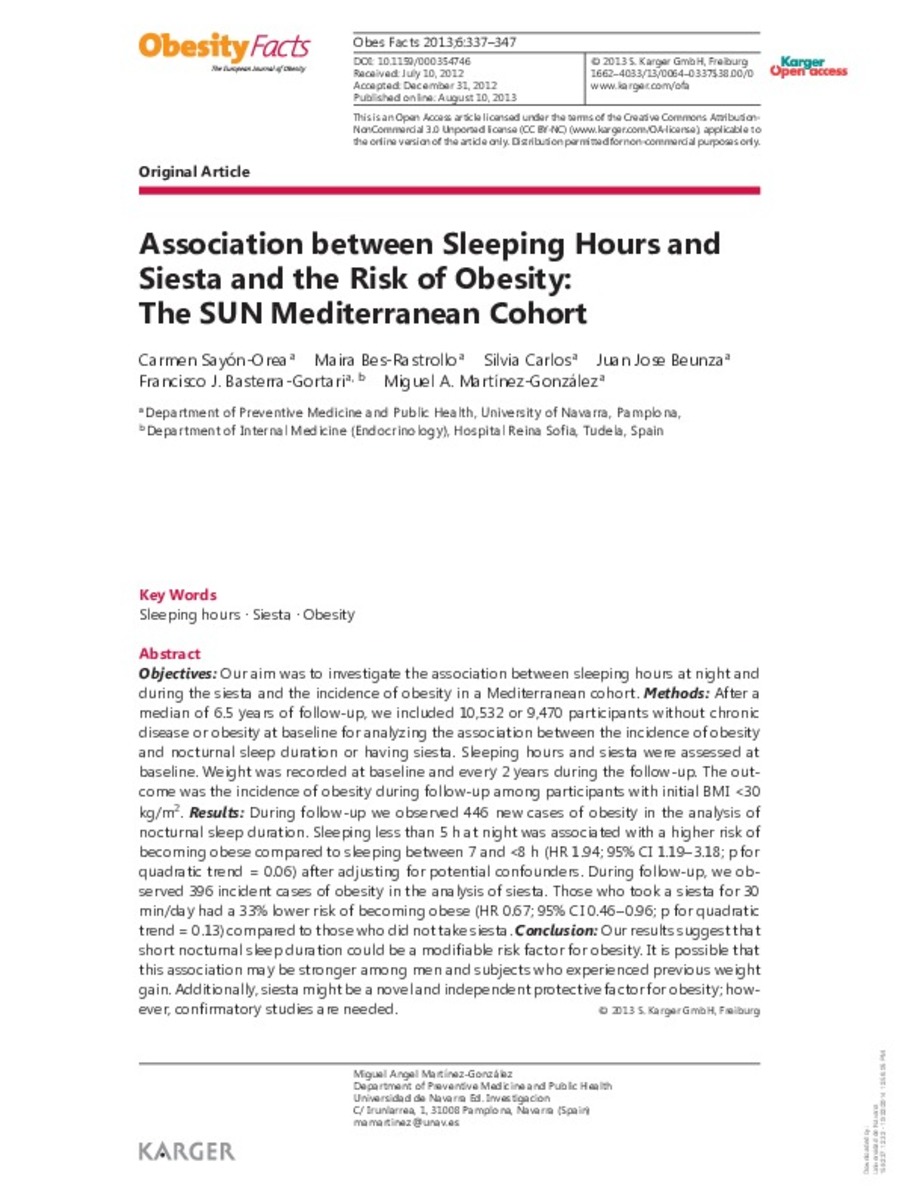Full metadata record
| DC Field | Value | Language |
|---|---|---|
| dc.creator | Sayon-Orea, C. (Carmen) | - |
| dc.creator | Bes-Rastrollo, M. (Maira) | - |
| dc.creator | Carlos-Chillerón, S. (Silvia) | - |
| dc.creator | Beunza, J.J. (Juan José) | - |
| dc.creator | Basterra-Gortari, F.J. (Francisco Javier) | - |
| dc.creator | Martinez-Gonzalez, M.A. (Miguel Ángel) | - |
| dc.date.accessioned | 2014-10-22T11:03:46Z | - |
| dc.date.available | 2014-10-22T11:03:46Z | - |
| dc.date.issued | 2013 | - |
| dc.identifier.citation | Sayon-Orea C, Bes-Rastrollo M, Carlos S, Beunza JJ, Basterra-Gortari FJ, Martinez-Gonzalez MA. Association between sleeping hours and siesta and the risk of obesity: the SUN Mediterranean Cohort. Obes Facts 2013;6(4):337-347. | es_ES |
| dc.identifier.issn | 1662-4025 | - |
| dc.identifier.uri | https://hdl.handle.net/10171/36881 | - |
| dc.description.abstract | OBJECTIVES: Our aim was to investigate the association between sleeping hours at night and during the siesta and the incidence of obesity in a Mediterranean cohort. METHODS: After a median of 6.5 years of follow-up, we included 10,532 or 9,470 participants without chronic disease or obesity at baseline for analyzing the association between the incidence of obesity and nocturnal sleep duration or having siesta. Sleeping hours and siesta were assessed at baseline. Weight was recorded at baseline and every 2 years during the follow-up. The outcome was the incidence of obesity during follow-up among participants with initial BMI <30 kg/m(2). RESULTS: During follow-up we observed 446 new cases of obesity in the analysis of nocturnal sleep duration. Sleeping less than 5 h at night was associated with a higher risk of becoming obese compared to sleeping between 7 and <8 h (HR 1.94; 95% CI 1.19-3.18; p for quadratic trend = 0.06) after adjusting for potential confounders. During follow-up, we observed 396 incident cases of obesity in the analysis of siesta. Those who took a siesta for 30 min/day had a 33% lower risk of becoming obese (HR 0.67; 95% CI 0.46-0.96; p for quadratic trend = 0.13) compared to those who did not take siesta. CONCLUSION: Our results suggest that short nocturnal sleep duration could be a modifiable risk factor for obesity. It is possible that this association may be stronger among men and subjects who experienced previous weight gain. Additionally, siesta might be a novel and independent protective factor for obesity; however, confirmatory studies are needed. | es_ES |
| dc.language.iso | eng | es_ES |
| dc.publisher | Karger | es_ES |
| dc.rights | info:eu-repo/semantics/openAccess | es_ES |
| dc.subject | Materias Investigacion::Ciencias de la Salud::Medicina preventiva | es_ES |
| dc.subject | Sleeping hours | es_ES |
| dc.subject | Siesta | es_ES |
| dc.subject | Obesity | es_ES |
| dc.title | Association between sleeping hours and siesta and the risk of obesity: the SUN Mediterranean Cohort | es_ES |
| dc.type | info:eu-repo/semantics/article | es_ES |
| dc.identifier.doi | http://dx.doi.org/10.1159/000354746 | es_ES |
Files in This Item:
Statistics and impact
Items in Dadun are protected by copyright, with all rights reserved, unless otherwise indicated.






